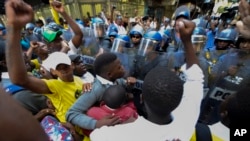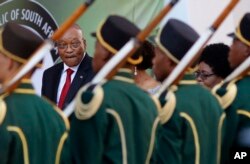South African analysts predicted high drama during this year's state-of-the-nation address. President Jacob Zuma is facing low approval ratings as the nation's economy drags, and his popularity appears to have bottomed out.
Drama, they got, and then some — in the form of a brawl, as rowdy, red-uniformed opposition members fought burly, white-shirted security guards Thursday after more than an hour of bitter haranguing, obscenities and vitriol. Outside the parliament building in Cape Town, police fired stun grenades and tear gas at protesters.
Zuma has drawn the ire of the opposition — and much of the electorate — after a string of corruption scandals, including his use of more than $20 million in government funds to upgrade his private rural home. His unpopularity, some analysts say, was the driving force behind the ruling African National Congress' loss of several key municipalities in last year's local elections. He also has faced a vote of no confidence, which failed, late last year.
Economic woes
Furthermore, unemployment has risen since he took office in 2009, to 26 percent from 24 percent. South Africa's currency, worth 8 rand to one U.S. dollar when he became president, now hovers around 13 to the dollar. Its instability has been in sync with Zuma's unpopular political moves, like his sudden decision to go through three finance ministers in a week in late 2015.
The anger against Zuma was palpable both inside parliament and among protesters who gathered in the streets of Cape Town ahead of the annual speech Thursday. Sensing this, the presidency summoned 441 soldiers to parliament, in a move the office said was necessary for safety and security.
That didn't deter the anger inside the chamber.
"Please leave!" yelled far-left politician Mbuyiseni Ndlozi of the Economic Freedom Fighters as Zuma sat calmly and waited for the speaker of the house to try to restore order. "You don't belong here. You're a constitutional delinquent."
"This entire gathering is unconstitutional," intoned EFF MP and Hollywood actor Fana Mokoena. "For the first place, it should not be addressed by someone who has flouted his own oath of office!"
Tear gas, stun grenades
Both men were ejected from the chambers. Outside, police sprayed tear gas and lobbed stun grenades at the restless crowd.
When the dust and gas had settled — nearly 90 minutes after he was scheduled to begin — Zuma calmly rose, laughed, coughed, made a joke about feeling the effects of the tear gas, and said one word: "Finally."
He then launched into a speech that, despite its lack of oratorical flourishes, was in many ways startling. The ANC has vowed to embark on "radical economic transformation" — a plan that Zuma said could fundamentally shift who owns property in the nation.
"We mean fundamental change in the structure, systems, institutions and patterns of ownership, management and control of the economy in favor of all South Africans, especially the poor, the majority of whom are African and female," he said.
"We are saying that we should move beyond words to practical programs," he said. "The state will play a role in the economy to drive that transformation."
As he spoke and members of his party clapped politely, local news stations changed to a split-screen view of the scene outside parliament as opposition leaders spoke angrily to TV crews and riot police hovered nearby — underscoring the fact that the real political action in South African politics is no longer in the halls of parliament. It's on the streets.





